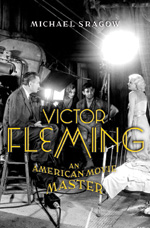(Pantheon Books, 656 pages, $40)
By Michael Sragow
 That man is a poet, probably one of the great unsung men of this business," said fabled MGM producer Arthur Freed. "One of the great chameleons," said Steven Spielberg. "We honor his movies and don't know him—because he did his job so well." And dashingly handsome to boot: "Blue eyes, iron-gray hair, bronzed face...almost as dashing as Rhett Butler," said gossip columnist Hedda Hopper breathlessly.
That man is a poet, probably one of the great unsung men of this business," said fabled MGM producer Arthur Freed. "One of the great chameleons," said Steven Spielberg. "We honor his movies and don't know him—because he did his job so well." And dashingly handsome to boot: "Blue eyes, iron-gray hair, bronzed face...almost as dashing as Rhett Butler," said gossip columnist Hedda Hopper breathlessly.
This was Victor Fleming, best known today for two imperishable classics he was commissioned to rescue, The Wizard of Oz and Gone With the Wind. Veteran film critic Michael Sragow has, with this comprehensive and beautifully written biography, established once and for all that Fleming was far more than someone who cleaned up other directors' messes.
Fleming died in 1949, too soon to be appreciated by the auteurists of the late 1950s, and by Sragow's account, was "rarely a self-conscious or ostentatious storyteller." All this aside, Fleming was a larger-than-life figure who banked a lot of experience before becoming a filmmaker. Born poor in La Canada, Calif. in 1889, he started out as an auto racer before shooting military training films during World War I and becoming, as Sragow puts it, one of "an entire generation of directors who cut their teeth helping D.W. Griffith on Intolerance." After a busy time directing silents in the 1920s, he came into his own as the sound era took hold, when directors were still like generals. Fleming was later cited by several of his stars as the man who helped hone their screen personae to perfection: Gary Cooper in The Virginian, Clark Gable in Red Dust, and Spencer Tracy in Captains Courageous. Their screen images, claims Sragow, partly reflected a desire to be Victor Fleming.
Sragow doesn't bury Fleming's less-attractive qualities: rumors of anti-Semitism, his membership late in life in the ferociously right-wing Motion Picture Alliance for the Preservation of American Ideals, and a reputation as a serial seducer of leading ladies. However, with this important work of film archeology, Sragow has succeeded in rescuing a major figure in Hollywood from calumny, amnesia and near-obscurity—warts and all.
Review written by John Patterson.